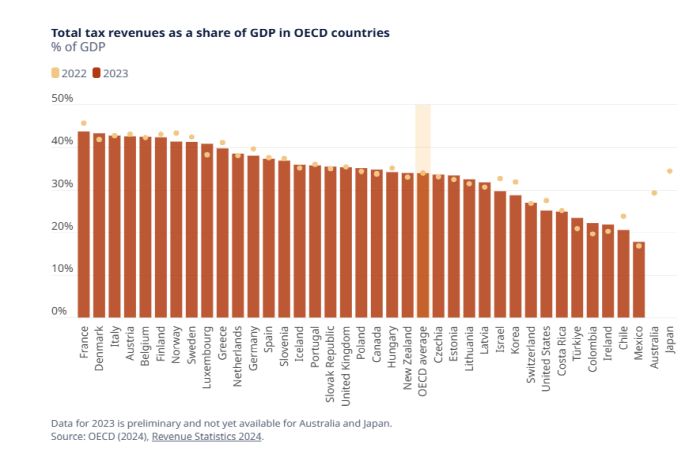PARIS, France – The average level of tax revenues among OECD countries was largely unchanged in 2023 as governments sought to ease cost-of-living pressures amid growing spending challenges related to climate change and ageing populations, according to a new report released today.
Revenue Statistics 2024 shows that the average tax-to-GDP ratio for OECD countries was 33.9 percent in 2023, 0.1 percentage points (p.p.) below its level in 2021 and 2022, but above its pre-pandemic level of 33.4 percent in 2019.
In 2023, the tax-to-GDP ratio increased in 18 of the 36 OECD countries for which preliminary data are available, declined in 17, and remained unchanged in one. The largest increases (of at least 2.5 p.p.) occurred in Luxembourg, Colombia and Türkiye, while the largest declines (of at least 3.0 p.p.) were observed in Israel, Korea and Chile.
Across the OECD, tax-to-GDP ratios ranged from 17.7 percent in Mexico to 43.8 percent in France in 2023. The difference between the highest and the lowest tax-to-GDP ratio across OECD countries was 26.1 p.p. in 2023, the smallest difference since at least 2000. Since 2019, this difference has narrowed by 5.2 p.p.
Revenue Statistics 2024 includes a special chapter on health taxes, which are increasingly common in OECD countries due to their capacity to generate revenues and to improve health outcomes by reducing consumption of harmful products. On average across OECD countries, revenues from excise taxes on alcohol, tobacco and sugar-sweetened beverages amounted to 0.7 percent of GDP and generated 2.2 percent of total tax revenues in 2022. However, these revenues declined as a proportion of GDP between 2000 and 2022 in almost all OECD countries, with the largest drop seen in revenues from excise taxes on alcohol.
Consumption Tax Trends 2024, also released today, highlights governments’ ongoing efforts to improve the performance of their VAT systems and combat fraud and non-compliance. The report shows that VAT revenues continue to rise across the OECD, reaching 20.8 percent of total tax revenue on average in 2022, up 0.1 p.p. from 2021.
According to the new report, which presents cross-country detailed comparative data on consumption tax rates, tax bases and design trends, most OECD countries have implemented reforms to ensure that VAT is effectively collected on online sales, in line with OECD standards, ensuring a level playing field between bricks-and-mortar businesses and online merchants.
Twenty-seven OECD countries have introduced solutions developed by the OECD to collect VAT on e-commerce sales of goods imported from abroad. These complement measures to collect VAT on online services – such as apps and streaming services – that have now been adopted by almost all OECD countries that have a VAT.
Consumption Tax Trends 2024 explains that almost all OECD countries with a VAT have now implemented digital reporting requirements, often requiring the electronic transmission of detailed transactional information in real time or periodically, to enhance VAT compliance. However, the scope and requirements of these regimes vary across OECD countries.





